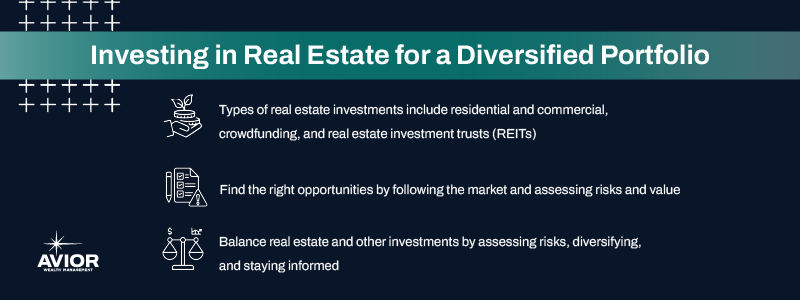Investing in Real Estate for a Diversified Portfolio
The real estate market provides investors with unique options for diversification, supporting long-term growth and success.

Diversification is a key strategy for managing risk and enhancing potential returns. While stocks and bonds can diversify portfolios, real estate investments also comprise a valuable asset class. Real estate provides the potential for significant returns while diversifying your portfolio to protect against market swings.
This post explores the benefits of incorporating real estate into a diversified portfolio and how it can contribute to long-term financial success.
Types of real estate investments
Real estate investments give you several options for diversifying your portfolio. Consider residential versus commercial real estate. Residential includes single-family homes or apartments, and you can earn returns through rental income and potential appreciation over time.
Commercial real estate offers longer lease terms and the potential for higher returns compared to residential investments. Returns come from rental income and property value appreciation driven by demand and economic factors.
Real estate investment trusts (REITs) give you a way to invest in real estate without direct ownership. These publicly traded companies own, operate, or finance income-generating real estate. Investors in REITs receive dividends from rental income and benefit from capital appreciation based on the underlying asset’s value.
Another option is real estate crowdfunding. This involves pooling funds from multiple investors to finance real estate projects and allows individuals to participate in real estate with smaller amounts of capital, promoting accessibility. Returns depend on the success of the underlying project, and investors may receive income or profit distributions.
Finding the right real estate investment opportunities
When you’re looking for opportunities and weighing options, consider factors like risk tolerance, liquidity, involvement level, and market conditions. Residential real estate tends to have lower risk but potentially lower returns, while commercial real estate and crowdfunding may offer higher returns with higher risk. REITs provide liquidity, as they are traded on stock exchanges, while direct ownership may lack this liquidity.
Conduct thorough market research to understand local demand and potential growth factors. Analyze economic indicators, employment trends, and population growth to gauge market stability.
In addition, utilize multiple valuation methods, such as comparable sales and income approaches, to assess property value. Factor in potential renovation costs and market appreciation when determining overall investment value.
Stay informed about local and broader real estate market trends, including emerging neighborhoods, shifts in demand, and economic indicators. Evaluate technological advancements, sustainability trends, and demographic shifts that impact real estate as well.
Balancing real estate and other assets
A diversified approach, blending various real estate options, can contribute to a well-rounded investment portfolio. Achieving an optimal balance with your other asset classes helps you manage risk and maximize returns. Use these strategies:
- Define your investment goals: Clearly articulate your investment goals, time horizon, and risk tolerance. This foundation helps determine the appropriate allocation to real estate within your portfolio.
- Diversification: Diversify within the real estate asset class by considering different types of properties, geographic locations, and real estate investment vehicles.
- Rebalancing: Regularly rebalance your portfolio to maintain the desired allocation. Market fluctuations can cause the weightings of asset classes to drift, and rebalancing ensures the portfolio aligns with your strategic allocation.
- Liquidity: Consider your liquidity needs and time horizon. Real estate investments, particularly direct ownership, can be less liquid than other assets. Align your real estate exposure with your ability to access funds when needed.
- Stay informed: Stay in the know about market trends, interest rates, and regulatory changes that may impact the real estate market. Being proactive and adaptable allows for informed decision-making.
These tactics will help you establish a balanced portfolio, leveraging real estate’s unique benefits while effectively managing risk and optimizing returns across various market conditions.
Managing risks and returns in real estate
Real estate investments come with specific risks that require thoughtful management. Here are a few to watch for and how to deal with them:
Market volatility
Market volatility is a big risk in real estate. To manage it, spread investments across different types of real estate and locations to reduce vulnerability to regional market fluctuations. Regularly assess market conditions, economic indicators, and local factors. Maintain sufficient cash reserves to cover mortgage payments and expenses during economic downturns.
Property management
Someone has to manage the properties you invest in. Consider professional property management services to handle day-to-day operations, tenant issues, and property maintenance. Implement rigorous tenant screening processes to minimize the risk of problematic tenants. It’s also wise to save a reserve fund for unexpected property-related expenses and vacancies.
Interest rates
It’s hard to predict what will happen with interest rates, as the post-pandemic landscape showed. Consider fixed-rate mortgages to lock in interest rates and protect against rising rates. Explore interest rate hedging strategies to manage interest rate risks associated with variable-rate financing.
Regulatory changes
Keep abreast of regulatory changes and zoning laws that may impact property values or development opportunities. Consult legal professionals to ensure compliance with local regulations and to navigate any related challenges.
Manage real estate investing with the Avior team
Real estate is a worthy alternative investment when diversifying your portfolio. Pay attention to the market’s performance and define your risk tolerance. Always work with a financial expert when considering new investment avenues.
Avior specializes in wealth management services catered to your unique goals. Talk to our team today to learn how we help you succeed.
Disclaimer: Nothing contained herein should be construed as legal or tax advice. Avior and our Advisors will work with your attorney and/or tax professional to assist with your legal and tax strategies. Please consult your attorney or tax professional with specific legal and/or tax questions. Investment Management and Financial Planner are offered through Avior Wealth Management, LLC, an SEC-registered investment advisor. Past performance is not a guarantee of future results. Investments are subject to loss, including the loss of principal.
No Comments
Sorry, the comment form is closed at this time.




